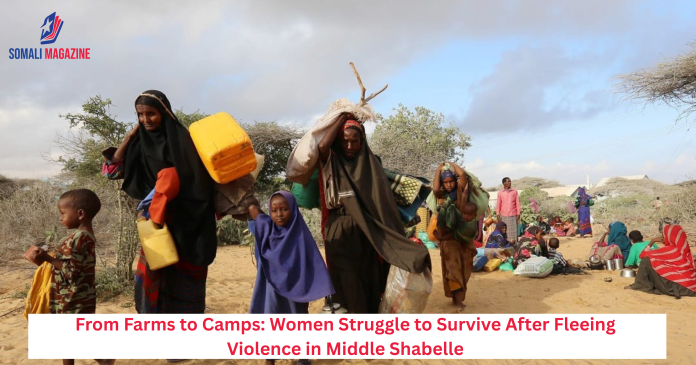Facebook Twitter (X) Instagram Somali Magazine - People's Magazine
Hawa Haji Ahmed used to live with her husband and children on their farm in Timiro village, Middle Shabelle region. Life wasn’t easy due to drought, but they managed. Then, everything changed. A violent clan conflict broke out over farmland, and her family was forced to flee. Now, they live in War-jano camp for displaced people in Deynile district, Mogadishu.
In the camp, Hawa, a mother of six, has lost everything—her home, food, water, and the farm that once provided their income. The family depends on kind neighbors for food. “Sometimes we go to sleep hungry. I cook at night, and in the morning the children eat leftovers,” Hawa said.
Her days start with walking around Mogadishu, hoping to find laundry work. But most days, she comes back empty-handed. If she’s lucky, she makes around $3 a day. When there’s no work, they go hungry. Her youngest child is only three years old.
Water is also hard to get. A 20-litre bucket costs 2,000 Somali shillings, and when Hawa can’t afford it, she borrows from neighbors. She then walks an hour to fetch the water and carries the heavy load on her back.
In April, a storm destroyed the small hut they were living in. Now Hawa and her children sleep with a neighbor’s family, waiting for help that hasn’t come yet. Her husband died shortly after they arrived in Mogadishu, leaving her alone to care for the children.
Hawa’s story is not unique. Many other families from the Jowhar district, like Halima Yusuf Hirsi, are going through the same pain. Halima, a mother of five, fled from her farm in Buri area. She had invested $100 to grow cassava, bananas, and beans. But when fighting broke out, she had to leave everything behind.
Now, Halima and her children survive on leftover vegetables from Mogadishu’s Bakara market. “We eat one meal a day. Yesterday, I worked as a porter, but I only earned enough to cover transport costs. I came home with nothing and put my child to sleep hungry,” she said.
Halima lives in a tiny hut made of wood and cloth, which doesn’t protect her family from rain or sun. Her children, who once went to a free Koranic school, now have no access to education. She dreams of returning home, but the fighting hasn’t stopped. Her husband was killed during the conflict, so she’s raising the children alone.
Caynaba Ali Ubeyd, a 62-year-old mother of 10, also lives in the camp. She used to live in Hawadley, 40 km from Jowhar, where she supported her family through a five-hectare farm. She had borrowed $500 to plant food and vegetables earlier this year, hoping to pay it back after the harvest. But then the violence forced her to flee.
Now, those who lent her the money are asking for it, but Caynaba can’t even feed her children. “We go whole days without food. My children are suffering, and so am I,” she said. Her husband is disabled and cannot work. They all live in a single hut that doesn’t protect them from the weather.
Caynaba can’t do manual labor because of her age, and laundry jobs are rare. She feels hopeless and has no idea how to lift her family out of this situation.
The ongoing drought and clan conflict have forced hundreds of families like Hawa’s, Halima’s, and Caynaba’s to flee their homes in Middle Shabelle. Now in Mogadishu, many live in camps without jobs, food, or shelter, struggling to survive each day.

